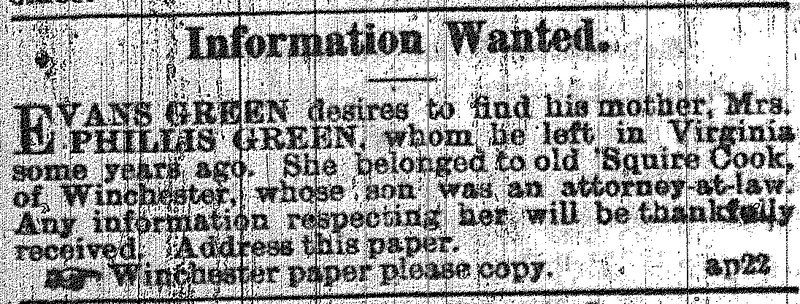After Slavery In America: Loved Ones Found In Wanted Ads
- dthholland
- Aug 30, 2019
- 4 min read

The Aftermath of Emancipation
The abolition of slavery in the United States, formalised by the 13th Amendment in 1865, marked a pivotal moment in the nation’s history. For millions of formerly enslaved African Americans, freedom meant an opportunity to rebuild lives shattered by generations of bondage. However, one of the most immediate and heartbreaking challenges was the fragmentation of families. During slavery, it was common for enslaved individuals to be forcibly separated from their loved ones. Husbands were torn from wives, children were sold away from parents, and extended family members were scattered across plantations, often across state lines. This traumatic reality of separation meant that, after the Civil War, many newly freed African Americans were left searching for lost relatives.
In the aftermath of emancipation, one of the most striking methods used to reconnect with lost family members was the "Wanted" or "Information Wanted" ads. These ads appeared in newspapers, particularly in African American publications, where former slaves would post notices seeking information about family members they had lost contact with during the years of slavery.

The Role of Newspapers in Reuniting Families
During the late 19th century, newspapers became an essential medium for African Americans to connect with their communities and, most importantly, to attempt to reunite with loved ones. These publications, which began to flourish post-emancipation, offered newly freed individuals a voice in public discourse that they had long been denied. One of the most notable publications that hosted these ads was The Christian Recorder, a newspaper of the African Methodist Episcopal Church. Starting in the 1860s, the paper became a crucial hub for people trying to track down family members.

These "Information Wanted" ads were often brief, but they contained poignant details. Individuals would provide their own names, sometimes the name of the person they were looking for, a description, details about the last time they had seen them, and the name of the enslaver who had owned them. A common refrain in these ads was a deep yearning for connection and the hope that their loved ones were still alive, despite the vast geographical distances and years that may have passed.
Here is an example of a typical ad from The Christian Recorder in 1865:
"Information Wanted of My Children. – I am anxious to learn the whereabouts of my three children, William, Henry, and Amanda. They were sold from me when young, by Mr. Thomas in Virginia, and taken to Texas. Their mother, Mariah, was also sold. Any information of them will be thankfully received by their father, Simon Green."
Another ad, published in The Christian Recorder in 1870, shows the heartbreak of a mother searching for her son:
"Information wanted of my son, Joseph, who was sold from me in Richmond, Virginia, ten years ago, and taken to New Orleans. He was last owned by a man named John Smith. I was sold shortly afterward to a different owner. If anyone has any knowledge of Joseph, please contact his mother, Mary Johnson."
The Emotional Weight of the Ads
These ads reflect the emotional toll of family separation during slavery. They are written with a clear desperation, showcasing the strength of familial bonds that transcended the brutal realities of enslavement. Despite the dehumanisation that enslaved individuals endured, the ads also serve as testimony to their resilience and love for one another. Each "Information Wanted" ad represents an attempt to reclaim the humanity and familial bonds that slavery had sought to strip away.
The ads were not merely a cry into the void; they were a form of hope and resistance. They signalled that even though slavery had ended, the long journey to healing and reuniting fractured families had only begun.

Reuniting Families: Success Stories
The success rate of these ads is difficult to quantify, but there are documented instances where families were successfully reunited through this medium. For example, an ad from The Southwestern Christian Advocate, another key African American newspaper, published in 1880, recounts how a man named John Battle was able to find his sister, whom he had not seen since they were children, after placing a notice in the paper.
In another heartwarming example, The Christian Recorder reported a reunion between a mother and her daughter in the 1880s. The mother had placed an ad looking for her daughter, who had been sold from her over twenty years prior. Someone who saw the ad recognised the name and informed the mother, leading to their reunion after decades of separation.
These success stories, though not always common, became symbols of hope for thousands of families still searching. They underscored the fact that despite the odds, the power of persistence, community, and the written word could yield miracles.
The legacy of these "Information Wanted" ads persists to this day. In the 21st century, scholars and historians have collected and digitised thousands of these advertisements, making them available to the public. Projects such as the "Last Seen: Finding Family After Slavery" initiative have created databases where descendants of formerly enslaved people can search for their ancestors and learn more about the post-slavery attempts at reunification. The archival preservation of these ads offers a powerful insight into the social history of African Americans and serves as a poignant reminder of the personal and familial costs of slavery.
Many of these ads can be viewed through online databases such as: